Key takeaways:
- Understanding personal motivation is essential for sustaining dedication in game development, whether it comes from problem-solving, storytelling, or community impact.
- Setting achievable goals and milestones helps in managing complexity and maintaining motivation throughout the development process.
- Building a supportive community fosters encouragement and collaboration, enhancing the motivation to create and improve.
- Incorporating regular breaks and revisiting initial sources of inspiration can rejuvenate creativity and enthusiasm during challenging phases.
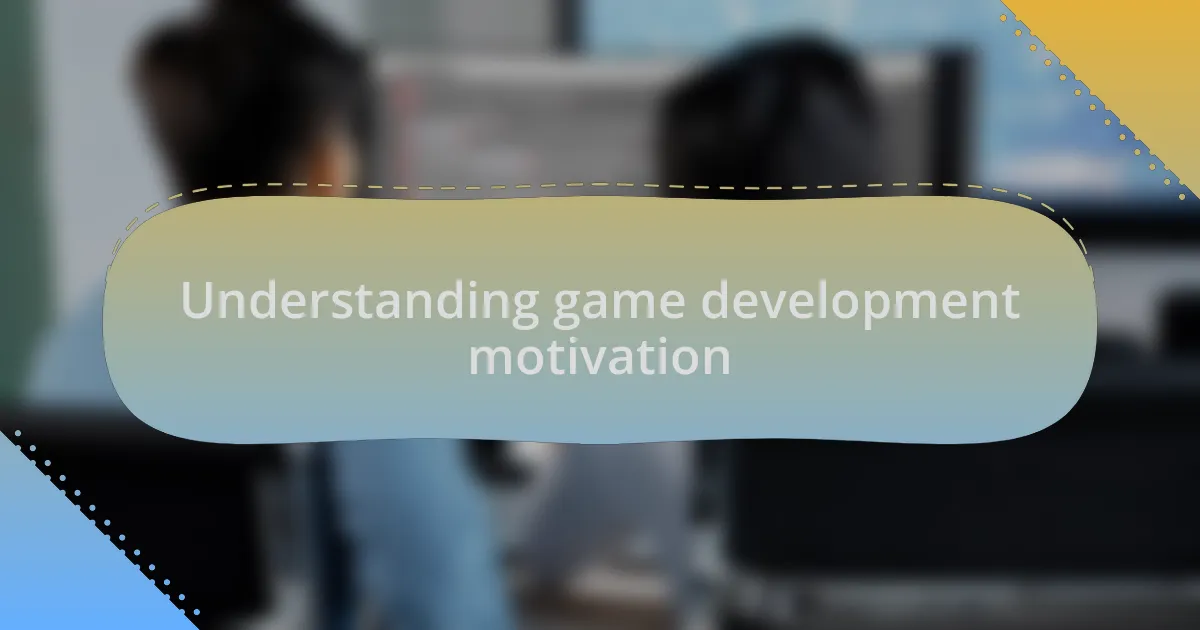
Understanding game development motivation
Motivation in game development is a complex interplay of passion, creativity, and personal goals. I still remember the thrill of finishing my first game; it was more than just coding for me—it was a dream becoming real. It’s these emotional highs that fuel my dedication to the craft, reminding me why I started in the first place.
Many developers struggle to maintain their drive, especially during lengthy projects. Have you ever felt that your enthusiasm wanes as a project drags on? I’ve experienced that too. When I hit those low points, I remind myself of the initial spark—the joy of creating something from scratch. This reflection can reignite my passion and help me push through challenging phases.
Understanding your personal motivation is crucial. What drives you: the thrill of problem-solving, the joy of storytelling, or perhaps the excitement of seeing others play your game? For me, it’s the sense of community that comes from sharing my work and seeing the impact it has on players. This connection can be incredibly powerful and serves as a constant source of motivation to keep creating and improving.
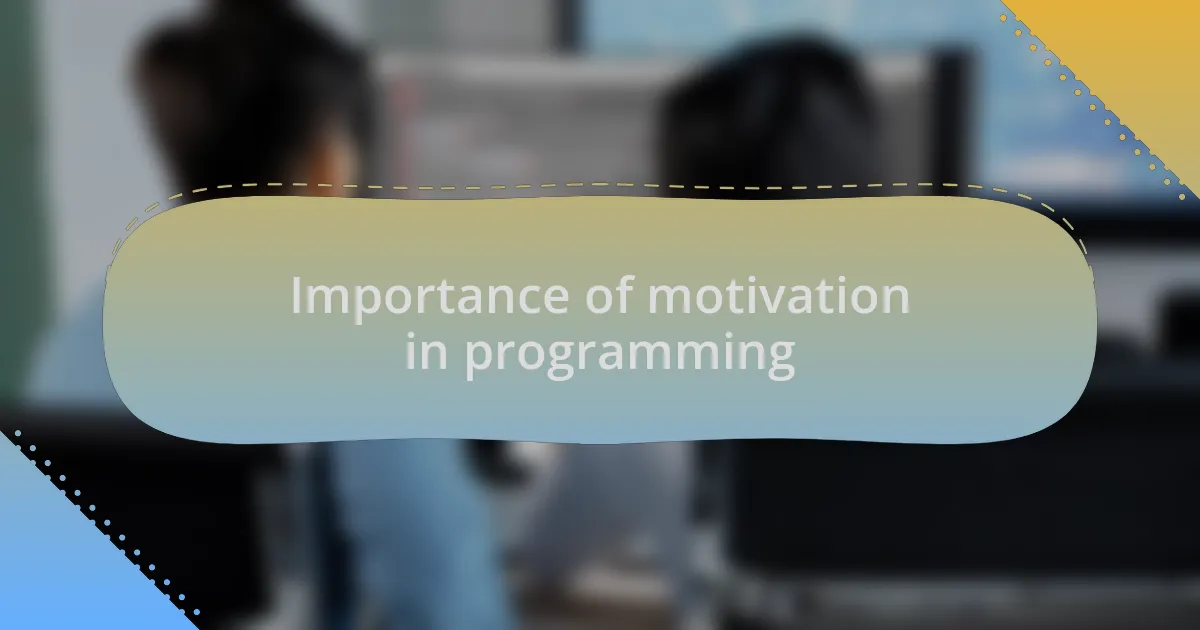
Importance of motivation in programming
Motivation plays a vital role in programming, especially when tackling complex projects. I have found that without a clear sense of purpose, it’s easy to get lost in the lines of code. Whenever I remind myself of the positive impact my games can have on players, I feel re-energized and focused on the task at hand.
Have you noticed how motivation can act like a double-edged sword? For me, there have been times when the excitement of a new tool or technique got me fired up, only to dissipate as the project progressed. During those moments, revisiting my original vision and the excitement it sparked helps me regain momentum and overcome obstacles.
Furthermore, the environment we create around ourselves significantly influences our motivation. I’ve learned that surrounding myself with passionate peers and engaging in discussions about game design creates a supportive atmosphere that nurtures my drive. There’s nothing quite like diving into a conversation about a shared passion to boost creativity and foster a deeper commitment to my work.
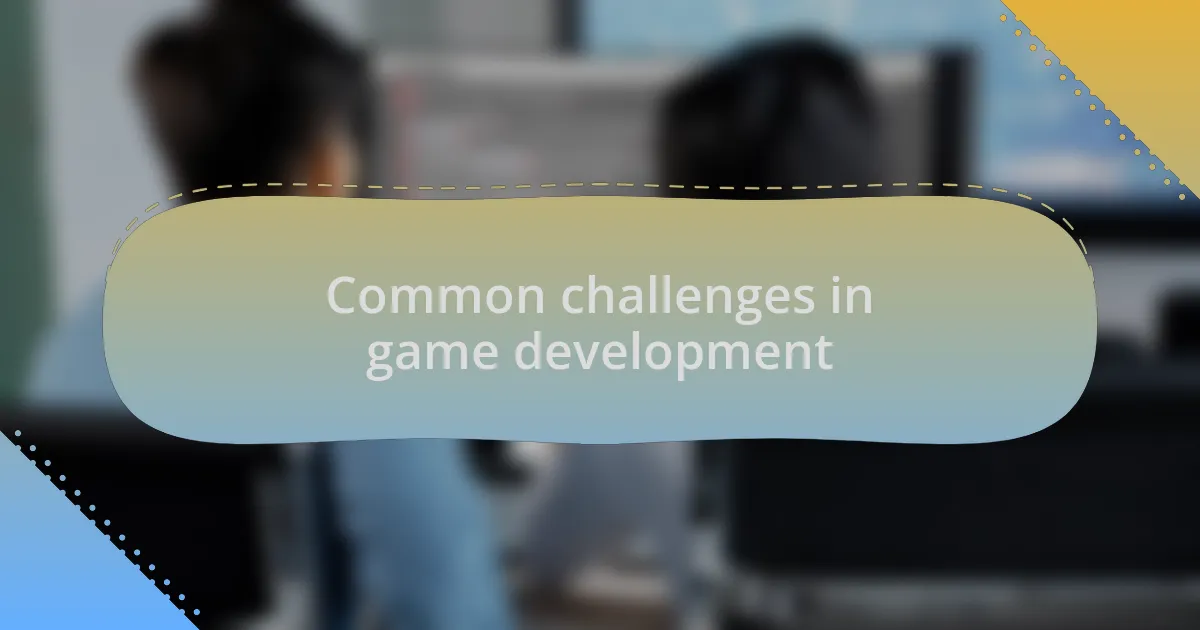
Common challenges in game development
One of the most frustrating challenges in game development is dealing with bugs and glitches. I distinctly remember a project where I spent hours debugging only to discover that a simple misplaced comma was causing a significant issue. It’s moments like these that test your patience and can lead to demotivation if not handled correctly. Have you ever felt the weight of a seemingly insurmountable bug? The key lies in maintaining a positive mindset and seeing these hurdles as opportunities to learn and improve.
Another hurdle many developers face is scope creep. When I first started creating games, I was eager to add every feature I could think of, which ultimately led to a project that felt unmanageable. I learned that sticking to a clear plan and defining what is essential is crucial for staying on track. Have you ever found yourself in a similar situation where an exciting idea derailed your original vision? It’s vital to remind ourselves that less can often be more in game development.
Finally, balancing creativity with technical constraints can be daunting. In one of my recent projects, I had an amazing concept in mind, but the limitations of my engine forced me to pivot my ideas. Navigating this tension is a common experience that requires flexibility and innovation. I often ask myself: how can I achieve my vision within these boundaries? Finding creative solutions makes the process not only rewarding but also a significant learning experience.
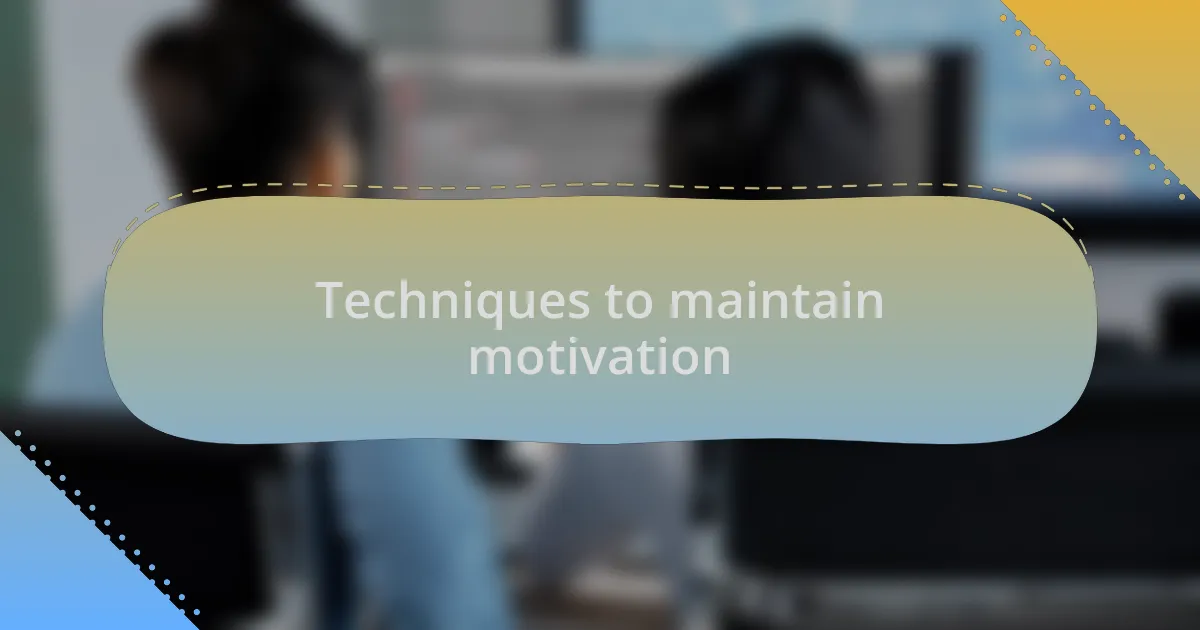
Techniques to maintain motivation
To maintain motivation during the ups and downs of game development, I often revisit my original inspiration. There are days when the excitement wanes, and I find it helpful to look back at the spark that led me to start the project. Have you ever experienced that rush of creativity when you first conceptualized your game? Reflecting on it can rejuvenate my passion and remind me of why I embarked on this journey in the first place.
Setting achievable milestones is another technique that has proven invaluable for me. I remember when I set small weekly goals for a complex project I was working on; the sense of accomplishment I felt after each completed task was incredible. It transformed daunting challenges into manageable steps. How do you celebrate your progress? Acknowledging even the smallest wins can keep the motivation flowing.
Lastly, surrounding myself with a supportive community has been crucial. During a particularly tough phase of development, I connected with fellow developers through online forums. Their shared experiences and encouragement made me realize I wasn’t alone in my struggles. Have you sought feedback or support from others? Engaging with like-minded individuals can reignite your enthusiasm and provide fresh perspectives that catapult your motivation.
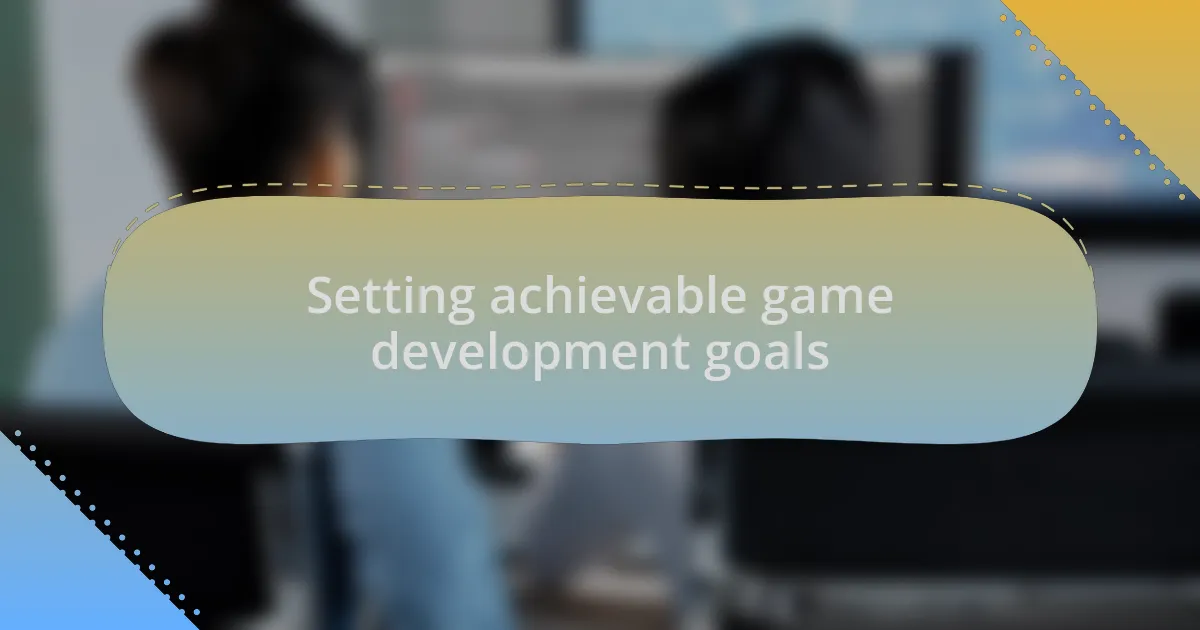
Setting achievable game development goals
Setting achievable goals in game development has truly transformed my approach over the years. One time, while creating a narrative-driven game, I realized that attempting to build the entire game at once was overwhelming. Instead, I broke it down into smaller objectives, like completing character designs or developing specific story arcs. Each tiny victory not only boosted my confidence but also kept my excitement alive. Have you ever tried focusing on just one aspect of your project at a time?
I also find it helpful to quantify my goals, making them as specific as possible. For instance, instead of saying, “I want to work on my game,” I set a target like “I will design three levels this month.” This clarity helps me measure my progress and adjust my plans if needed. How do you ensure your goals are visible and measurable? Keeping a checklist or a progress tracker has made a significant difference for me; it serves as a constant reminder of how far I’ve come.
Another key aspect is to remain flexible with my goals. Life can be unpredictable, and I’ve learned to adapt when setbacks occur. In my early days, missing a deadline crushed my motivation. Now, I treat these bumps as opportunities to recalibrate. Have you ever adjusted your timeline when unforeseen challenges arise? Embracing flexibility not only eases stress but also allows for creativity to flow when new ideas pop up unexpectedly.
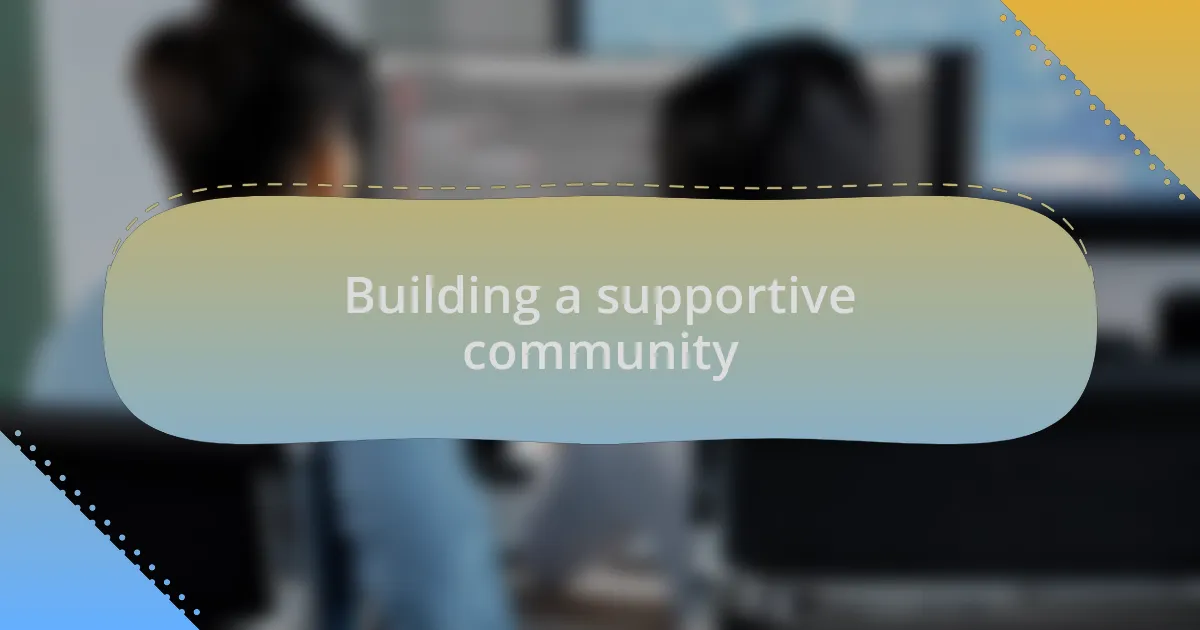
Building a supportive community
Building a community around game development has been a game-changer for me. I remember joining a local meetup where we shared our projects and struggles. It was incredibly reassuring to see others facing similar challenges; it reinforced the idea that I wasn’t alone in this journey. Have you ever experienced that sense of belonging in a group?
Finding the right platform to connect with fellow developers can make all the difference. I discovered online forums and social media groups that became my go-to places for encouragement and feedback. One time, I posted a demo of my game-in-progress, and the constructive criticism I received not only improved my project but also reignited my passion. How often do you engage with others in your field?
Creating a nurturing environment extends beyond seeking help; it’s about giving back as well. I make a point to provide support to newcomers by sharing my experiences, whether it’s through a simple comment or a detailed guide. It’s rewarding to see someone light up when they find success after I’ve offered my guidance. Isn’t it amazing how uplifting the spirit of community can be?
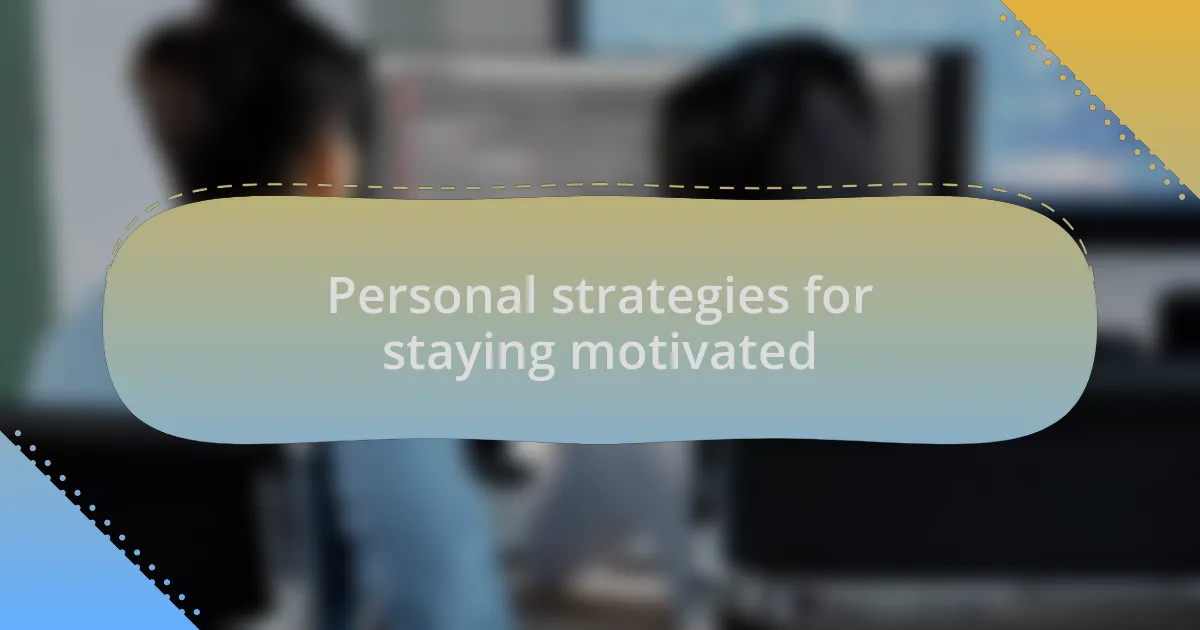
Personal strategies for staying motivated
One strategy that has consistently helped me stay motivated is setting small, attainable goals. When I first started developing my game, I often felt overwhelmed by the vastness of the project. By breaking it down into bite-sized tasks, I found joy in the little victories, like completing a level or perfecting a character’s animation. Have you ever noticed how each small accomplishment can fuel your determination to tackle the next challenge?
Another approach I’ve embraced is incorporating regular breaks into my development routine. I’ve experienced burnout firsthand, spending long hours engrossed in code, only to find my creativity stall. When I started taking time away from the screen to go for a walk or enjoy a hobby, I discovered that stepping back actually sparked new ideas. Isn’t it interesting how a change of scenery can bring fresh perspectives?
Lastly, I often revisit my initial inspiration for creating games. There’s something special about browsing through old sketches or revisiting a favorite game that initially sparked my interest. It’s a powerful reminder of why I started this journey in the first place. Have you ever delved back into your sources of inspiration to reignite your passion? Visualizing my goals reignites a fire within me, reminding me that the journey is just as important as the destination.